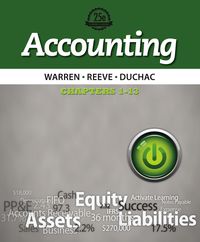Question
Quentin (46 years old) operated his own business making training films. His business operated on the basis of 50% down payment when a contract was
Quentin (46 years old) operated his own business making training films. His business operated on the basis of 50% down payment when a contract was signed and the remaining 50% was invoiced when the job was completed. No refunds were offered on the monies received. Quentin also sold a small range of television sets and sound systems. They were mainly sold to his film customers who used them to show his training films. He commenced his business in the previous year and it cost him $2,800 in legal and accounting fees to start operations.
Quentins income and expenditure for the year are as follows:
Receipts
- Income from training films $280,000.
This includes $30,000 for training films which were contracted last year and completed during the current year when the remaining 50% was invoiced and paid. It also includes paid invoices of $50,000 for training films which would be completed in the following year.
- Sale of television sets and sound systems $63,000.
$3,000 was from a sale made during the prior year. Quentin offered a 60-day payment plan to his customers. During the current year he made sales of $12,000 which had not been paid during the current year.
- Salary from the Air Force Reserve $4,100.
- Sale of previous business on 1 July 2019 for $170,000. Quentin had bought the business for $150,000 on 10 November 2013. He paid $2,250 in Stamp Duty on that day. Quentin had taken out a 12-year loan of $200,000 to help him buy the business and provide some initial working capital. It commenced on 10 November 2013. He had paid interest of $24,000 during the loan period and borrowing costs of $3,180 on 10 November 2013. Quentin paid out the loan when he sold the business.
- Sale of vacant land on 1 March 2020 for $30,000. The land had been bought on 1 March 1998 for $25,000. Stamp duty cost $375 and rates and land taxes totalled $3,000. Commission on sale was $1,200
- Dividend received from his wifes company Pulp Fiction Pty Ltd, $10,000 and it had franking credits of $4286 attached.
Expenses
- Cleaning of Air Force Reserve uniform $250
- Entertainment expenses of $6,200. 40% related to staff and the remainder to clients
- Motor vehicle expenses $7,400 50% related to Quentins private use
- Purchase of film $83,000. Film on hand at 1 July 2019 was $6,800 and on hand at 30 June 2020 was $11,900 at cost price, $12,700 at replacement price and $15,600 at market selling value. Quentin wished to minimise his tax
- Rent on premises $18,000. This included a prepayment of $6,000 for 6 months rent for the following year which was paid on 1st June 2020
- Repairs to second-hand camera bought on 30 June 2020 $850
- Repairs to film editing equipment after Quentin dropped a glass of wine on it $1,100
- Subscription to Film Makers Australia $400
- Subscription to Film Guild of Australia $300
- Superannuation for staff $10,300
- Superannuation for Quentin $20,000
- Wages to staff $90,000
- Wages to his de-facto spouse $25,000. Staff doing a similar job were paid $22,500
- Tax Agents Fee $1200
Notes:
Quentin had made a capital loss in the prior year of $12,000.
The business made a loss of $23,000 in the prior year after deducting a donation of $2,000 to the Red Cross.
Quentin existing plant and equipment as well as new purchases and disposals are as follows:
Plant on hand
Item Cost $ OAV at 1.7.2019 Rate
Furniture office 14,600 6,000 10% diminishing value
Film equipment 25,000 18,000 40% diminishing value
Editing equipment 30,000 22,000 20% diminishing value
Computer System 12,000 6,000 20% prime cost
Purchases
Item Purchase date Price $ Effective life
Film Equipment 1.10.2019 35,000 4 years
Camera 1 16.1.2020 5,800 5 years
Camera 2 1.6.2020 1,500 2.5 years
Sales
Item Sale date Sale price $
Film Equipment 1.10.2019 32,000
Furniture Office 5.5.2020 4,000
Camera 1 30.6.2020 5,000
Required:
Calculate Quentins taxable income and net tax payable including Medicare Levy assuming he is an SBE taxpayer but he chooses not to use pooling for UCA purposes.
You are also required to complete the relevant Uniform Capital Allowance Schedule/s.
You need to explain and provide references to the legislation to why you have excluded an item.
Step by Step Solution
There are 3 Steps involved in it
Step: 1

Get Instant Access to Expert-Tailored Solutions
See step-by-step solutions with expert insights and AI powered tools for academic success
Step: 2

Step: 3

Ace Your Homework with AI
Get the answers you need in no time with our AI-driven, step-by-step assistance
Get Started


